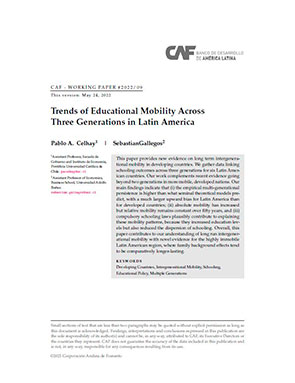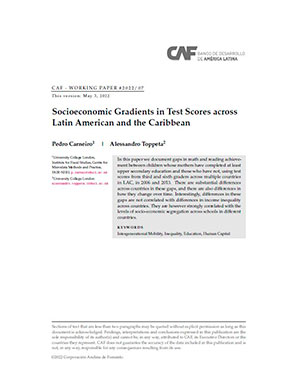Working mothers and intergenerational mobility: evidence from sibling schooling gaps in Venezuela
Resumo
This paper documents the change in intergenerational mobility over the 35 year period between 1975 and 2010 in Venezuela and finds that equality of opportunities increased significantly from the mid 1970's until around 1988, then stagnated/reverted slightly up to 2004, when it again began to improve. Publicly provided education and the generalized increase in the demand for schooling throughout the period is insufficient to explain such changes in measured mobility. Instead, the pattern of female labor force participation is nearly the mirror image of the mobility index. A simple model and its empirical implications suggest that as mothers' time at home is substituted by other factors in the production of children's educational outcomes, family (mother's) characteristics become more important in child school achievement; this is consistent with a literature that finds negative effects of childcare on cognitive achievement, as other inputs are imperfect substitutes for mothers' time with the child.
Assunto
País / Región
Data
2011Cite esta publicação
Item que pertence à coleção
Items Relacionados
Trends of Educational Mobility Across Three Generations in Latin America
This paper provides new evidence on long term intergenerational mobility in developing countries. We gather data linking schooling outcomes across three ...
Spillovers of health education at school on parents´ physical activity
To prevent modern health conditions like obesity, cancer, cardiovascular illness, and diabetes, which have reached epidemic-like proportions in recent ...
Socioeconomic Gradients in Test Scores across Latin American and the Caribbean
In this paper we document gaps in math and reading achievement between children whose mothers have completed at least upper secondary education and those ...






